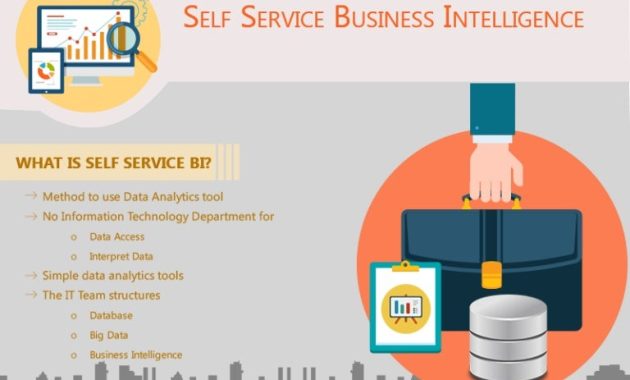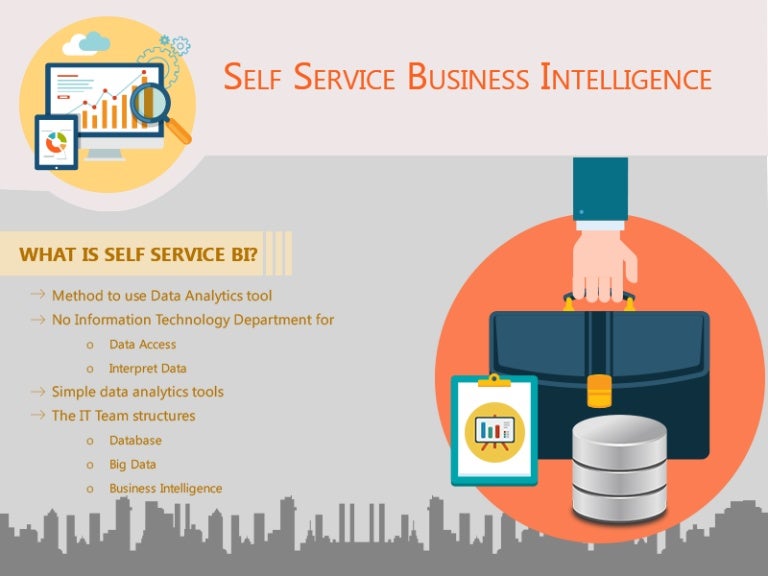
Self-Service Business Intelligence Software: A Revolution in Data Accessibility
The modern business landscape is awash in data. Companies collect and generate information at an unprecedented rate. However, this data often remains locked away in isolated systems, creating information silos. These silos hinder collaboration, slow down decision-making, and limit the potential for strategic insights. The solution? Self-service business intelligence (BI) software. This innovative technology is transforming how businesses access, analyze, and utilize data, empowering employees across all departments.
Self-service business intelligence software allows users to connect to various data sources. It then enables them to create their own reports and dashboards. This removes the dependence on IT or specialized data analysts. Employees can now explore data, identify trends, and generate insights independently. This fosters a data-driven culture and accelerates the pace of business innovation. This article will explore the benefits and features of this powerful software. It will also cover how it eliminates data silos and empowers organizations.
The Problem of Data Silos
Data silos are a significant challenge for many organizations. They occur when data is stored in isolated systems. These systems are often incompatible with each other. This can lead to several problems. It includes limited data visibility, inconsistent reporting, and delayed decision-making. Employees in different departments may have access to different data sets. They may not be able to see the complete picture of the business. This lack of a unified view can lead to:
- Inefficient collaboration.
- Duplication of effort.
- Missed opportunities for growth.
Traditional BI solutions often exacerbate these problems. They typically require specialized skills and extensive IT involvement. This makes it difficult for non-technical users to access and analyze data. The result is a bottleneck. It slows down the process of extracting valuable insights. Self-service business intelligence software directly addresses these issues. It provides a user-friendly interface that empowers business users to access and analyze data independently.
How Self-Service BI Software Eliminates Silos
Self-service business intelligence software breaks down data silos in several key ways:
- Data Integration: These tools connect to a wide range of data sources. This includes databases, spreadsheets, cloud services, and more. They consolidate data from disparate systems into a single, accessible platform.
- User-Friendly Interface: They offer intuitive drag-and-drop interfaces. They allow users to create reports and dashboards without coding. This empowers business users to explore data and generate insights on their own.
- Data Governance: They often include features for data governance. This ensures data quality, security, and compliance. This helps organizations maintain control over their data assets while promoting self-service analysis.
- Collaboration Features: Many platforms offer collaboration tools. These allow users to share reports, dashboards, and insights with colleagues. This promotes teamwork and knowledge sharing across departments.
By providing a unified view of data and empowering users to analyze it independently, self-service business intelligence software eliminates the limitations of data silos. This unlocks the full potential of an organization’s data assets.
Key Features of Self-Service BI Software
Self-service business intelligence software offers a variety of features. These features allow users to analyze data and generate actionable insights. Some of the most important features include:
- Data Visualization: Powerful data visualization tools are essential. They transform raw data into interactive charts, graphs, and maps. This makes it easier to understand trends and patterns.
- Data Exploration: These tools allow users to drill down into data. They can explore different dimensions and filter results to gain deeper insights.
- Reporting and Dashboards: They allow users to create custom reports and dashboards. These can be shared with colleagues or used to track key performance indicators (KPIs).
- Data Preparation: Many platforms offer data preparation capabilities. This allows users to clean, transform, and shape data before analysis.
- Mobile Access: Accessing data on the go is critical. Many platforms offer mobile apps or responsive designs. This allows users to view reports and dashboards from any device.
These features, combined with a user-friendly interface, make self-service business intelligence software a powerful tool for data analysis and decision-making.
Benefits of Implementing Self-Service BI
Implementing self-service business intelligence software offers numerous benefits. These benefits can transform an organization’s ability to leverage data. Some key advantages include:
- Improved Decision-Making: Empowering users with data leads to faster and more informed decisions.
- Increased Efficiency: Automating reporting and analysis frees up valuable time for IT and data analysts.
- Enhanced Collaboration: Sharing data and insights across departments fosters teamwork.
- Reduced Costs: Eliminating the need for specialized data analysts can reduce costs.
- Increased Agility: Responding quickly to market changes is crucial. This software enables faster insights.
By providing these benefits, self-service business intelligence software helps organizations become more data-driven and competitive.
Choosing the Right Self-Service BI Software
Selecting the right self-service business intelligence software is crucial for success. Consider these factors when choosing a platform:
- Ease of Use: The platform should have an intuitive, user-friendly interface.
- Data Connectivity: Ensure it can connect to all your data sources.
- Data Visualization Capabilities: Look for a platform with a variety of visualization options.
- Reporting and Dashboarding Features: The platform should offer robust reporting capabilities.
- Scalability: The software should be able to handle your growing data needs.
- Security and Governance: Ensure the platform offers adequate security and data governance features.
- Cost: Consider the pricing model and ensure it aligns with your budget.
Thoroughly evaluating your needs and comparing different platforms will help you choose the best self-service business intelligence software for your organization.
Real-World Examples: How Self-Service BI Transforms Businesses
Many businesses have successfully implemented self-service business intelligence software. They are now experiencing significant improvements in their operations. Consider these examples:
- Retail: Retailers use the software to analyze sales data. They identify trends and optimize inventory management.
- Healthcare: Healthcare providers use it to track patient outcomes. They also improve operational efficiency.
- Finance: Financial institutions use it to monitor financial performance. They also detect fraud.
- Marketing: Marketing teams analyze campaign performance. They optimize marketing spend and improve ROI.
These examples demonstrate the versatility and impact of self-service business intelligence software across various industries. The software is a key driver for data-driven decision-making.
The Future of Self-Service BI
The future of self-service business intelligence software is bright. Advances in technology will continue to shape this field. We can expect to see:
- Increased Automation: Artificial intelligence (AI) and machine learning (ML) will automate more tasks. It will include data preparation and insight generation.
- Enhanced Collaboration: Collaboration features will become more sophisticated. This will facilitate teamwork and knowledge sharing.
- Improved Data Governance: Data governance features will become more robust. It will ensure data quality and security.
- Greater Accessibility: Self-service BI will become even more accessible to business users.
As technology evolves, self-service business intelligence software will become even more powerful and essential. It will empower organizations to unlock the full potential of their data. The software will help them make better decisions and achieve their business goals. [See also: The Role of AI in Business Intelligence]
Conclusion: Embracing the Power of Self-Service BI
Self-service business intelligence software is a game-changer for businesses. It eliminates data silos. It empowers employees to access and analyze data independently. The software fosters a data-driven culture. It improves decision-making and drives business success. By embracing this technology, organizations can unlock the full potential of their data assets. They can gain a competitive edge in today’s dynamic business environment. It is a crucial investment for any organization. It wants to thrive in the data age. Consider implementing self-service business intelligence software today. It will help you break down silos and make better decisions.

